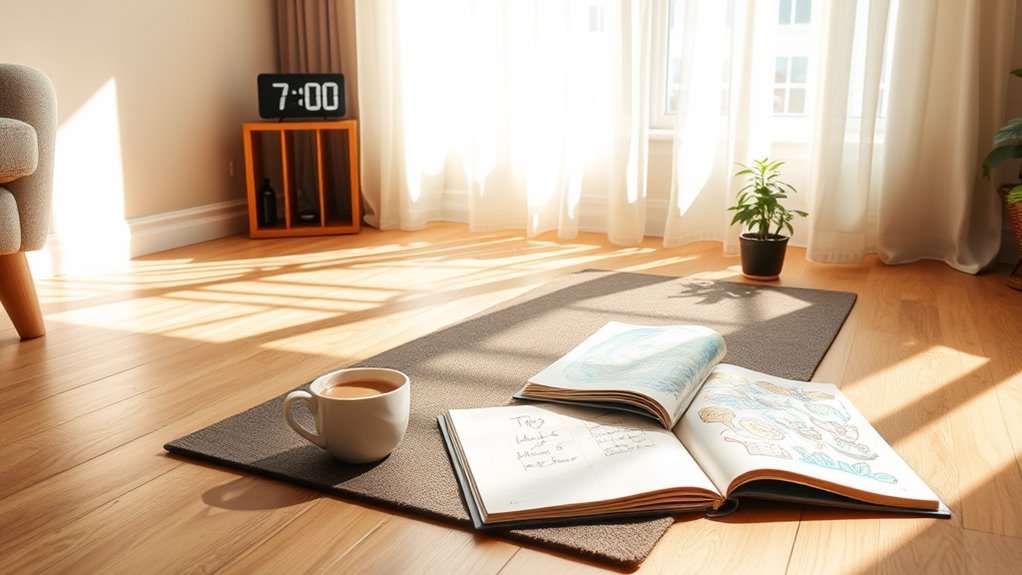What to Do Before Bed to Ensure You Sleep Like a Baby
To sleep like a baby, you need to establish a calming bedtime routine. Start winding down at the same time each night, avoiding screens and heavy meals close to bedtime. Create a relaxing environment by keeping your bedroom cool, dark, and quiet. Incorporate relaxation techniques like deep breathing and gentle stretching to ease your mind. Don’t forget to avoid caffeine in the evening, as small changes can greatly enhance your sleep quality. Discover more ways to improve your nightly rest.
Key Takeaways
- Establish a consistent bedtime routine with relaxing activities like reading or gentle stretching to signal your body it’s time to wind down.
- Create a calming sleep environment by keeping your bedroom dark, quiet, and cool, while ensuring comfort with a supportive mattress and pillows.
- Limit screen time before bed to reduce blue light exposure and engage in calming alternatives like journaling or meditation.
- Practice relaxation techniques such as deep breathing or progressive muscle relaxation to help alleviate stress and prepare your mind for sleep.
- Be mindful of your dinner choices; eat light meals 2-3 hours before bed and avoid caffeine and heavy foods to promote better sleep.
Establish a Consistent Bedtime Routine
When you establish a consistent bedtime routine, you signal to your body that it’s time to wind down. Start by setting a specific time to begin your routine each night.
Incorporate activities that promote relaxation, like reading or gentle stretching. Avoid screens and stimulating content—these can sabotage your efforts for better sleep. Try to limit heavy meals and caffeine in the hours leading up to bedtime as well.
Consider including calming rituals, such as aromatherapy or deep breathing exercises. Consistently following this routine trains your body to recognize when it’s time to sleep, enhancing your overall sleep quality. Additionally, integrating mindful practices can significantly enhance your ability to relax and unwind before bed.
Over time, you’ll find that these intentional actions lead to a more restful night and better sleep.
Create a Relaxing Sleep Environment
Alongside a consistent bedtime routine, creating a relaxing sleep environment can greatly enhance your ability to fall asleep faster and enjoy deeper rest.
Start by keeping your bedroom dark, quiet, and cool; these factors are essential for signaling your body it’s time to sleep. Invest in blackout curtains and consider a white noise machine to drown out distractions.
Your mattress and pillows should offer ideal support and comfort, so don’t hesitate to replace them if they’re worn out.
Aromatherapy can also play a significant role; try using calming scents like lavender to create a soothing atmosphere.
Finally, declutter your space— a tidy bedroom promotes a tranquil mind and helps you relax as you prepare for sleep. Establishing a relaxing bedtime routine is key to significantly enhancing sleep quality.
Limit Screen Time Before Sleep
Screen time before bed can seriously impact your sleep quality, leaving you tossing and turning.
Instead of scrolling through your phone, consider alternative wind-down activities that help you relax and prepare for rest. You might be surprised by how much better you feel when you limit your exposure to screens at night. Engaging in simple nighttime rituals can significantly transform your sleep and enhance your overall well-being.
Impact on Sleep Quality
While many people enjoy unwinding with their favorite shows or scrolling through social media before bed, this habit can significantly hinder sleep quality. The blue light emitted by screens disrupts your circadian rhythm, making it harder to fall asleep. Additionally, engaging content can overstimulate your mind, delaying sleep onset. Here’s a quick breakdown of the impacts:
| Effect | Description | Duration |
|---|---|---|
| Difficulty Falling | Harder to fall asleep | Minutes to hours |
| Reduced REM | Less time in deep sleep stages | Varies by individual |
| Increased Wakefulness | More frequent nighttime awakenings | Ongoing |
| Decreased Alertness | Feeling groggy upon waking | Until mid-morning |
| Mood Disruption | Increased irritability and stress | Entirely next day |
Mastering the art of restful sleep starts with limiting screen time in those essential hours before bed.
Alternative Wind-Down Activities
Instead of losing track of time on your devices, consider engaging in calming activities that promote relaxation and prepare your mind for sleep.
Try reading a book—preferably something light or inspiring—to shift your focus from the day’s stresses. You could also practice gentle yoga or meditation, helping you release any tension and center your thoughts.
Journaling about your day or writing down your worries can declutter your mind and facilitate a smoother shift to sleep. Aromatherapy, using a calming scent like lavender, can further enhance your wind-down routine.
Choose a soothing playlist with soft music or nature sounds to create a serene atmosphere. By replacing screen time with these alternatives, you’ll prime your body for restorative sleep, ensuring you wake refreshed.
Practice Relaxation Techniques
To unwind after a long day, practicing relaxation techniques can greatly enhance your sleep quality.
Incorporating these methods into your evening routine can help signal to your body that it’s time to rest. Here are four effective techniques to try:
-
Deep Breathing: Focus on your breath by inhaling deeply through your nose, holding for a few seconds, then exhaling slowly through your mouth. Repeat several times.
-
Progressive Muscle Relaxation: Tense and then relax each muscle group, starting from your toes and working up to your head.
-
Guided Imagery: Visualize a peaceful scene, allowing your mind to wander and immerse itself in the tranquility.
-
Meditation: Spend a few minutes in stillness, concentrating on the present moment to calm your mind and body. Engaging in deep breathing techniques can significantly reduce stress levels and promote a restful night’s sleep.
Avoid Heavy Meals and Caffeine
To get a restful night’s sleep, you should watch what you eat and drink before bed.
Heavy meals and caffeine can disrupt your sleep cycle, so consider timing your meals and opting for lighter, caffeine-free alternatives. It’s also important to note that common sleep mistakes can further affect your sleep quality, so being mindful of these factors is crucial. Also, practicing portion control can help you feel comfortable and ready to rest.
Timing of Meals
While it’s tempting to indulge in a late-night snack or a cup of coffee, timing your meals can greatly impact your sleep quality.
To optimize your nighttime rest, consider these guidelines:
-
Eat dinner at least 2-3 hours before bed: This allows your body to digest properly, minimizing discomfort.
-
Limit heavy or rich foods: Foods high in fat can disrupt sleep by causing digestive issues.
-
Avoid caffeine after mid-afternoon: Caffeine can linger in your system, preventing you from falling asleep.
-
Opt for light snacks if necessary: If you’re hungry in the evening, choose easy-to-digest options like yogurt or a banana.
Caffeine-free Alternatives
If you’re looking for a way to wind down at night without the jolt of caffeine, consider incorporating caffeine-free alternatives into your evening routine.
Herbal teas, like chamomile or peppermint, can soothe your mind and prepare you for restful sleep. You might also try warm milk or almond milk, both rich in sleep-promoting tryptophan.
Decaffeinated beverages, such as coffee or green tea, offer comforting flavors without the stimulating effects. Additionally, consider a calming warm water infused with lemon or honey; it aids digestion and relaxation.
Avoid heavy meals close to bedtime, as they can disrupt your sleep cycle. By choosing these relaxing options, you’ll greatly enhance your nighttime ritual and pave the way for a more peaceful sleep.
Portion Control Strategies
Making mindful choices about your evening meals can greatly impact your sleep quality. To guarantee restful nights, consider these portion control strategies:
-
Opt for Smaller Portions****: Keep dinner light—aim to fill your plate with lean proteins and veggies, avoiding oversized servings.
-
Avoid Heavy Meals****: Steer clear of rich, fatty foods that can disrupt digestion, making it harder to fall asleep.
-
Limit Caffeine: Skip coffee or caffeinated beverages at least six hours before bedtime to prevent stimulating effects.
-
Establish a Cut-off Time: Set a boundary for eating—ideally, finish your last meal 2-3 hours before sleep to allow your body to process food.
Keep a Sleep Diary
Keeping a sleep diary can be a game-changer for improving your sleep quality. By documenting your sleep patterns, you’ll gain insight into what impacts your rest.
Note the time you go to bed, when you wake up, and any nighttime awakenings. Record your daily habits too—caffeine intake, exercise, and emotional stress can all influence your sleep.
After a week, analyze your entries. You might spot trends that reveal specific behaviors disrupting your slumber. Aim to identify patterns and make adjustments tailored to your needs.
Consistency is key; keep the diary every night. This practice empowers you to make informed decisions, ultimately paving the way to a more restful night.
Master your sleep journey by taking control of your habits effectively.
Engage in Light Stretching or Yoga
After tracking your sleep patterns, consider incorporating light stretching or yoga into your nightly routine.
These practices not only enhance flexibility but also calm your mind and body, preparing you for restful sleep.
Here are four effective stretches to try:
-
Child’s Pose: Kneel and stretch your arms forward, allowing your forehead to rest on the mat.
-
Cat-Cow Stretch: Alternate between arching and rounding your back to release tension in your spine.
-
Seated Forward Bend: Sit with extended legs and reach toward your toes, promoting relaxation and hamstring flexibility.
-
Supine Spinal Twist: Lie on your back, drawing one knee across your body to deepen spinal release.
These gentle movements can greatly improve your sleep quality and help you unwind before bed.
Consider Aromatherapy or Sleep Aids
To enhance your nighttime routine, consider integrating aromatherapy or sleep aids, which can greatly promote relaxation and improve your sleep quality.
Essential oils like lavender and chamomile can create a soothing atmosphere; simply diffuse them in your bedroom or apply a few drops to your pillow.
If you’re interested in sleep aids, explore options like melatonin supplements, which help regulate your sleep cycle. Choose products with proven efficacy, and consult a healthcare professional to determine the right dosage for your needs.
Create a calming pre-sleep ritual by combining these elements—lighting a candle, sipping herbal tea, or indulging in a warm bath.
Prioritizing these practices can markedly elevate your ability to drift off and stay asleep through the night.
Frequently Asked Questions
How Long Does It Take to Establish a Bedtime Routine?
Establishing a bedtime routine typically takes about three to four weeks. Consistency is key; by sticking to your schedule, you’ll train your body to recognize signals for sleep, enhancing your overall restfulness and quality.
What Scents Are Best for Sleep Aromatherapy?
Lavender, chamomile, and cedarwood scents are great for sleep aromatherapy. They promote relaxation and calm your mind. Experiment with essential oils or candles, and see which ones resonate with you for a peaceful night’s rest.
Can Napping During the Day Affect Nighttime Sleep?
Yes, napping during the day can affect your nighttime sleep. If you nap too long or too late, you might find it harder to fall asleep at night. Keep naps short and earlier in the day.
Should I Avoid All Screens or Just Certain Devices?
You should avoid all screens, especially smartphones and tablets, that emit blue light, as they can disrupt your sleep hormone production. Focus on reading or relaxing activities to promote better sleep without interference from digital devices.
Is It Safe to Use Sleep Aids Long-Term?
Using sleep aids long-term can lead to dependence and potential side effects. It’s essential you consult with a healthcare professional to evaluate your specific situation and explore alternative strategies for achieving restful sleep effectively.





